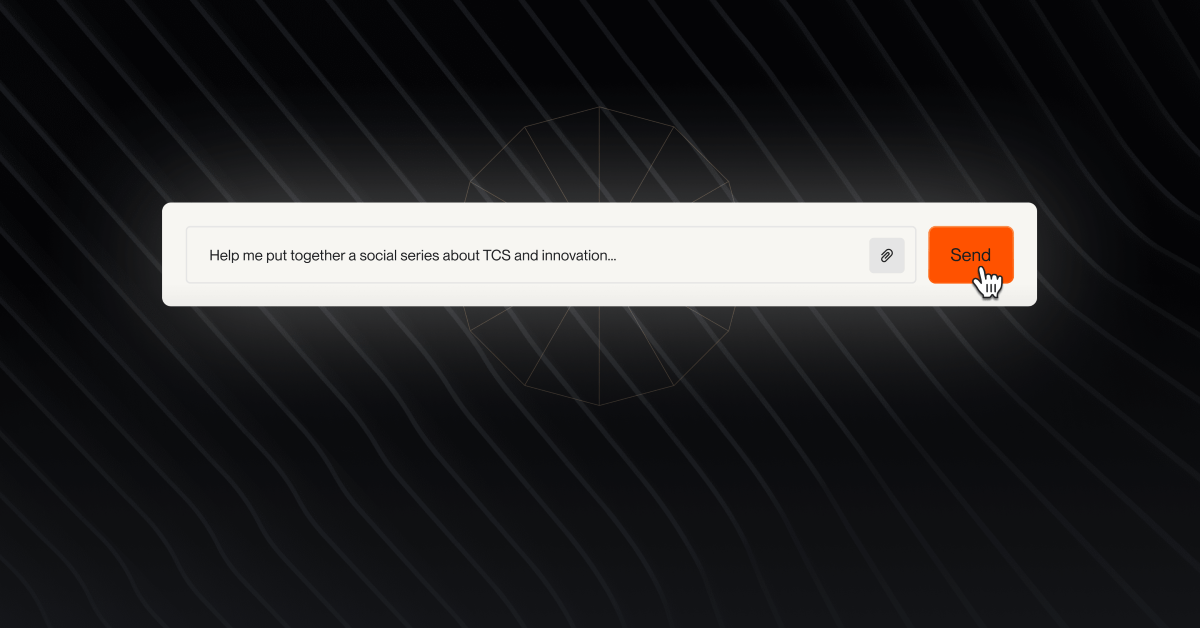Right now, many marketers are sceptical about leaving AI "alone". To let it be fully responsible for generated content and campaigns. "Don't worry, a human looked at this before we published!" is now a standard response.
AI will complete some work entirely on its own, and we should accept that. Why? Because AI is the future of marketing. Getting all red-faced when we admit AI was involved is not the right strategy. But just as importantly, we need to accept where AI's features should be human-led or left out entirely.
Let's discuss why you and your company need to get comfortable with AI taking control of certain aspects in your marketing strategies, how AI-generated content can still be delivered with a "human touch", and where you should prioritise a human-led approach.
Why are marketers sceptical about AI-generated content?
While AI adoption in marketing tools is growing, with 70% growth in AI text generation for email marketing, AI scepticism is still persistent. One study indicates that some executives are becoming more cautious, with over 50% discouraging AI adoption due to concerns about traceability and security.
I think the caution is understandable. For two reasons.
Reason one: we're hitting people over the head with the message: "a machine can deliver marketing campaigns 100X faster than you".
I don't know about you but I'm naturally going to look for chinks in the AI's armour. "Oh, yeah? Well, 100x faster and 100x... worse-r." I think this is a natural, human response to something that feels threatening to the way we currently work.
And if you researched some of the prior biases and controversies over AI models, then you’re probably going to have second thoughts about the role of AI in your business's marketing.
But it’s more than that, I think. Reason two is marketers fear that by letting go of control, they'll lose the emotional depth in their content and campaigns that defines human interaction. That's a real fear, right? What makes a marketing campaign really good is a memorable hook, a relatable story, an authentic voice. And with gen AI as it is currently, you don't really get that, do you?
Bonus reason (three): We fear being judged for outsourcing tasks to AI. That it's seen as lazy, that it doesn't honour the work it should take to create a heartfelt campaign.
Hence the need to prove that AI-generated content has been human-proofed. "Don't worry, it's had the heartfelt treatment".
What is human-led AI?
Marketers are turning to human-led AI to retain control over the final output. Human-led AI can be defined as AI systems that are developed, guided, and supervised by humans throughout their lifecycle. Instead of AI operating autonomously or in isolation, human-led AI emphasises the collaboration between human expertise and machine intelligence to ensure the technology aligns with the following:
- Human values
- Ethics
- Strategic objectives
Experts like Marc Werner, CEO of Faculty, an AI Consultancy, advocate for a human-led AI approach that emphasises developing AI to support and augment human capabilities rather than replace them. Others like Sören Stamer, CEO and Co-Founder of CoreMedia, believe that AI's promise is in boosting its capability of keeping human to human communication at the heart of customer outreach.
Human-led AI in marketing
Right now, you’re likely using a human-led AI approach in various areas of your marketing like the following:
- Chatbots: AI chatbots handle simple queries and perform initial interactions. However, for more complex issues or emotional support, the system seamlessly transitions the conversation to a human agent, blending efficiency with empathy.
- Email marketing: AI helps determine the best times to send emails, segment audiences, and even suggest subject lines. Plus, AI can generate email content based on prompts that direct on audience, topic and messaging. However, human marketers can evaluate the performance of AI suggestions to fine-tune messaging and brand voice.
- Social media: AI suggests optimal times to post, generates insights from social media trends, and even drafts post copy. Human marketers decide on the final content, manage interactions with followers, and steer the overall tone and direction of campaigns.
- Blogs and content creation: AI can generate entire outlines and a workable structure for blog posts based on prompts. However, human writers review and edit the output, adding the necessary emotional depth, personal experience, and strategic framing to ensure the content fits the audience and brand style. Marketers guide the AI’s tone, structure, and purpose, ensuring the content meets specific objectives.
Fifty Five and Five: Leave AI alone...for some things
At Fifty Five and Five, we firmly believe that AI has the power to be more than just an assistant — it can be trusted to work independently on many tasks. AI is already transforming the marketing landscape, and marketers need to embrace that shift. We have.

Example of TCS prompt for social content generation in Compass
Take, for example, our tool Compass. It has become a pivotal way for how we generate social media posts (one of our clients uses it for that too), as well as assisting in the creation of content for internal and external use. In fact, we only use other AI platforms for tasks that Compass can’t do (yet). It has efficiently freed up our team to focus on more strategic and creative endeavours.
Trusting AI with content creation
Many marketers still feel the need to oversee every AI-generated content, but we believe that’s unnecessary for certain types of content. Humans don't need to review every blog, social media post, or email.
For example, Apple launched the iPhone 16. In the past, tech marketers would have scrambled to create content about the launch quickly, trying to rank high for relevant search terms and try catch some of those sweet SEO waves. I could have easily got AI to write an article for me — complete with relevant keywords, facts, and a structure that adheres to SEO best practices. It could have been published without me ever touching it, and it would still perform well.
This isn’t just limited to blog posts. AI can generate personalised social media posts, email campaigns, and high-ranking keyword-focused articles, all tailored to specific audiences. And the best part? AI tools like Compass can learn your brand’s voice and style, so it doesn’t feel like a faceless machine created the content. It feels like it has that human touch you want your content to have.
AI can be personal
A common misconception is that AI-generated content can lack personal touch. I don't agree with that. Personalisation is about crafting content that speaks to an individual’s preferences, needs, and behaviour, right? Whether that content is created by a person, or a machine doesn’t matter as long as it resonates with the audience, i.e. it solves a problem. It delivers a valuable thing. The personal 'touch' idea is more about warmth — which is hard to define in writing. But to me it's writing that avoids clichés and tired expressions of a tired point. And your AI platform can avoid that guff. You just need to give it a steer at the beginning.
AI can personalise at scale in ways we can’t. It analyses vast amounts of data to identify what content will be most effective for each user, ensuring that every email, social post, or blog feels tailor-made for the recipient. AI learns from the data and adapts to the prompts and parameters we provide, effectively maintaining that all-important human touch.
Going beyond repetitive tasks
We see AI as much more than a tool for automating repetitive tasks. While that’s certainly one of its strengths, the potential of AI lies in its ability to tackle complex workflows and interconnect platforms to create seamless marketing experiences.
For instance, imagine a scenario where AI doesn’t just generate an email campaign but also optimises the timing, selects the right audience, and integrates with your CRM to personalise each message based on individual customer behaviour. This sort of thing is happening now, and it’s what the future of marketing looks like.
AI and the role of oversight
Of course, human oversight still plays a vital role in large-scale projects, where strategy and creativity are paramount. We’re not saying marketers should step back entirely. But it’s crucial to have confidence in AI’s ability to manage content generation with minimal oversight. AI is evolving rapidly, and its transformative potential is far from being fully realised.
While Stamer and Werner argue for a human-led AI approach, we believe that marketers need to become more comfortable with letting AI handle more responsibility. Obviously, we don’t entirely disagree with what they believe. Clearly there are tasks that require a human-led strategy. Think of long-term campaigns that have many hundreds or thousands of pounds invested. You can’t turn a blind eye to that. You clearly need to manage and oversee how the campaign is working and optimize accordingly, rather than leaving AI to manage it all.
It might be helpful to think of AI not just as a tool but as a full-time employee with a lot of potential. For now you should keep an eye on what it's doing, the progress its making and what jobs it can earn to do well. Just like you'd do with your latest hire.
Embracing the future of AI in marketing
At Fifty Five and Five, we’ve fully embraced AI’s role in reshaping marketing, and we believe it’s time for others to do the same. Yes, human oversight is still necessary for strategic and critical projects, but AI can handle more than you might think, often delivering results without the need for constant monitoring.
I think it's time to trust AI with the tasks that free up your time and actually improve your campaigns.
If you’re ready to discuss what AI can do in your marketing team, get in touch with us. We’re here to help you explore how AI can transform your marketing efforts, do really cool stuff and not come across as robotic muck.
Not just faster! Use AI to create better marketing content
We combine AI and human creativity to deliver B2B marketing that elevates customer experiences to new heights.
Check out our AI Innovators Report we've built that tailors its content to you, automatically.

